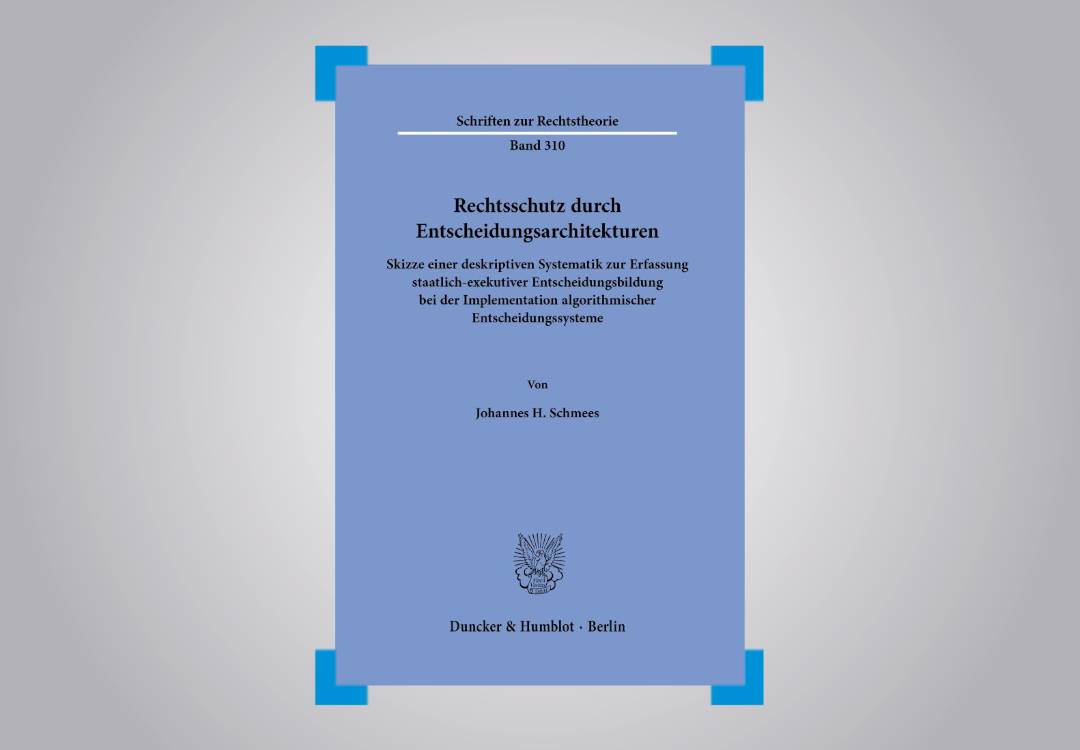

In his dissertation written at the HBI, Johannes Schmees deals with the state's use of algorithmic decision-making systems and its constitutional control. The entire work has now been published open access by Duncker und Humblot Verlag.
To Johannes Schmees' dissertation at the publisher's e-library
In the course of numerous technological developments, it has become increasingly possible for the state to use digital decision-making systems that are based on algorithms, can draw on comprehensive databases and are characterized by considerable complexity, efficiency and variability with regard to their use. The established topic of automation in the state and administration is subject to new dynamics during the current socio-technical transformation processes and is the reason for this work. Based on a critical examination of the legal understanding of decisions and decision-making, the need for interdisciplinary jurisprudence to analytically deconstruct and reconstruct the changing state-executive decision-making structures is established. For these purposes, the interdisciplinarily informed, 'descriptive systematics of decision architecture' is introduced, considering the constitutional requirements of control and individual legal protection, the application of which enables the derivation of concrete constitutional results as well as constructive, interdisciplinary analyses of complex state decision-making.
Schmees, J. H. (2024): Rechtsschutz durch Entscheidungsarchitekturen. Skizze einer deskriptiven Systematik zur Erfassung staatlich-exekutiver Entscheidungsbildung bei der Implementation algorithmischer Entscheidungssysteme [Legal Protection through Decision Architectures. Outline of a Descriptive System for Capturing State-Executive Decision-Making in the Implementation of Algorithmic Decision-Making Systems]. Duncker and Humblot Publishers. Publications on Legal Theory (RT), Volume 310. https://doi.org/10.3790/978-3-428-59086-5

In his dissertation written at the HBI, Johannes Schmees deals with the state's use of algorithmic decision-making systems and its constitutional control. The entire work has now been published open access by Duncker und Humblot Verlag.
To Johannes Schmees' dissertation at the publisher's e-library
In the course of numerous technological developments, it has become increasingly possible for the state to use digital decision-making systems that are based on algorithms, can draw on comprehensive databases and are characterized by considerable complexity, efficiency and variability with regard to their use. The established topic of automation in the state and administration is subject to new dynamics during the current socio-technical transformation processes and is the reason for this work. Based on a critical examination of the legal understanding of decisions and decision-making, the need for interdisciplinary jurisprudence to analytically deconstruct and reconstruct the changing state-executive decision-making structures is established. For these purposes, the interdisciplinarily informed, 'descriptive systematics of decision architecture' is introduced, considering the constitutional requirements of control and individual legal protection, the application of which enables the derivation of concrete constitutional results as well as constructive, interdisciplinary analyses of complex state decision-making.
Schmees, J. H. (2024): Rechtsschutz durch Entscheidungsarchitekturen. Skizze einer deskriptiven Systematik zur Erfassung staatlich-exekutiver Entscheidungsbildung bei der Implementation algorithmischer Entscheidungssysteme [Legal Protection through Decision Architectures. Outline of a Descriptive System for Capturing State-Executive Decision-Making in the Implementation of Algorithmic Decision-Making Systems]. Duncker and Humblot Publishers. Publications on Legal Theory (RT), Volume 310. https://doi.org/10.3790/978-3-428-59086-5
2024